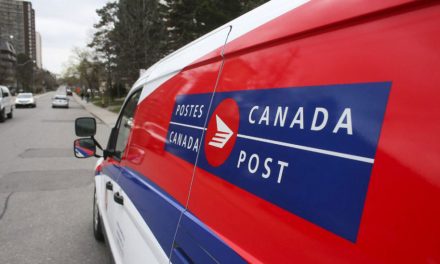
Canada Post Group records $58m loss in 2013
Canada Post Group made a $58m pre-tax loss last year, according to the company’s latest annual report, out yesterday. The company’s core mail business, Canada Post, drove the losses making a $125m pre-tax loss thanks to the continuing decline in letter volumes.
The state-owned firm has seen its transactional mail volumes fall 30% per address since 2007.
The 2013 loss was not quite so bad as the $188m net loss seen in the Group in 2011 after a month of strike action hit mail services, but it turned around the $127m profit achieved in 2012.
The extent of this year’s losses was softened by the sale of corporate assets in 2013 including $109m made from the sale of the company’s downtown Vancouver mail processing plant.
Commenting on the results, the company said the “historic shift” of customers away from paper-based transactional mail — letters, bills and statements — to digital alternatives meant an “urgent need” for “fundamental changes”.
The company is working on a Five-point Action Plan to attempt to address the fixed costs of its network as volumes dwindle. The Plan includes phasing out doorstep mail delivery in favour of community mailboxes, changes to stamp pricing, franchising out more postal outlets, streamlining the mail and parcel processing network and reducing the size of the workforce.
The Plan is expected to improve the bottom line by between $700m and $900, a year.
Canada Post’s revenue was flat compared to 2012, less than half a percent up on the previous year, and slightly behind the year’s business plan. But, operating costs were $298m less than expected thanks to productivity improvements in Canada Post and parcel business Purolator.
Parcels
With Canada Post increasingly aiming to be a “key enabler of e-commerce”, the company’s 7.2% growth in parcel revenues, to $93m, was a positive step in 2013. Domestic parcel revenue was $68m, up 7.5% compared to 2012.
Parcel volumes grew by 2.8% or 5m pieces in 2013, with domestic parcel volumes up by 6.9% or 7m pieces.
The company said a successful holiday season saw its fourth quarter parcel revenues growing by $42m or 9% year-on-year, with volumes up by 2.4% or 3m pieces.
“Continuing to succeed in the parcel business will be crucial to the success of the Group of Companies,” the firm commented, although it pointed out that the growth in the parcel business was not sufficient to cover the decline in the transactional mail business, which still accounts for 50% of Canada Post’s revenue.
Transactional mail fell by 230m pieces of 5.3% in 2013 compared to the year before. Canada Post said “intense competition” meant its direct marketing revenues were also down, by 2.8%, with volumes down 1.5% compared to 2012.
Banking
Commenting on the 2013 results, the Canadian Union of Postal Workers (CUPW), which represents more than 50,000 postal employees, said it was stepping up its campaign to prevent service cuts — with its belief that allowing Canada Post to get into postal banking would help alleviate its financial concerns.
“Our postal system is a valuable public service available to all who live in this country and that’s how it should stay. We need to believe in its future and help it grow, not kill another public service with cutbacks that will drive customers away,” said Denis Lemelin, National President of CUPW.
The union said an April 2014 poll showed 64% of Canadians in favour of a postal bank.
“Canada Post shouldn’t be engaging in a planned demolition of public postal service,” said Lemelin. “This annual report is a clear sign that the present managers of Canada Post need to rethink their plans.”
Pension
Meanwhile Canada Post’s pension plan achieved “strong” investment returns in 2013, of 16.9%, but revised life-expectancy assumptions applied further pressure on the plan’s solvency deficit.
As of the end of 2013, the plan’s solvency deficit is estimated at $6.3bn.
The Canadian government passed legislation in February (2014) that allow Canada Post to escape its duty to make special payments to cover some of the deficit between 2014 and 2017. But, the company said it would have to work with the unions on pension reforms before special payments resume in 2018.









